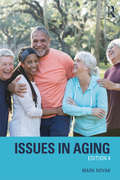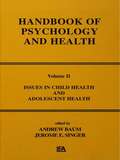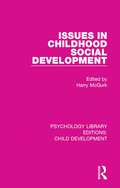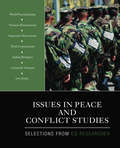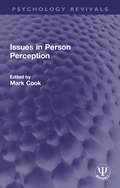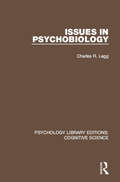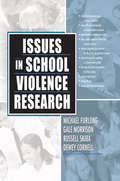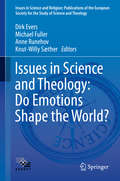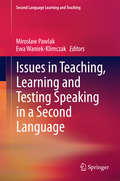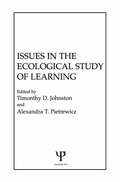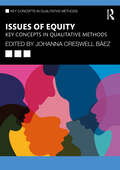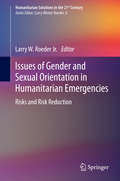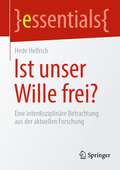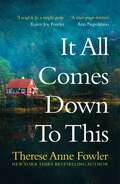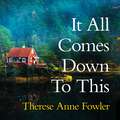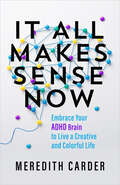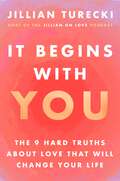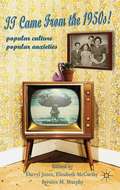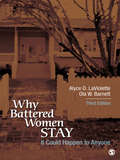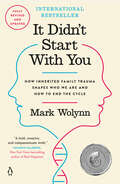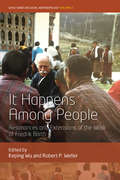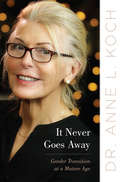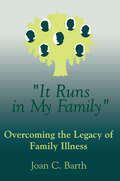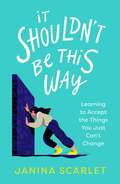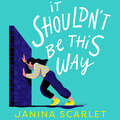- Table View
- List View
Issues in Aging: An Introduction To Gerontology (Mysearchlab Series 15% Off Ser.)
by Mark Novak<p>Issues in Aging combines social, psychological, biological, and philosophical perspectives to present a multifaceted picture of aging. Novak illustrates both the problems and the opportunities that accompany older age. This text helps students understand the tremendous variability in aging and introduces them to careers working with older adults. <p>This new edition reflects the continued changes in the way we age. The fourth edition has been updated to include emerging issues in aging. These include the prevalence of HIV/AIDs in later life, current research on mental potential in old age, the creation of age-friendly cities, and new options for end-of-life care. <p>Each chapter begins with a set of learning objectives to guide students in their reading, and concludes with a list of main points, questions for discussion or study, suggested readings, and relevant web sites to consult. Each chapter also includes up-to-date charts and graphs as well as key terms to help students understand the issues presented. Break out boxes reveal the human side of aging through the stories of individuals in real life and in the media.</p>
Issues in Child Health and Adolescent Health: Handbook of Psychology and Health, Volume 2 (Handbook of Psychology and Health Series)
by Andrew Baum Jerome E. SingerPublished in 1982, Issues in Child Health and Adolescent Health is a valuable contribution to the field of Psychology PP.
Issues in Childhood Social Development (Psychology Library Editions: Child Development #5)
by Harry McgurkOriginally published in 1978, contemporary theory and research into childhood social development had demonstrated the necessity to re-appraise the notion that socialization is merely a process of shaping the behaviour of the child to fit the mores of society. It was now evident that, from the beginnings of post-partum life, the human infant is an active participant in social encounters, modifying the behaviour of others as well as being influenced by them. Hence, social development must be construed as an interactive process, to which the young organism makes his own dynamic contribution. This book, comprising a collection of original essays by prominent investigators in the field, considers issues arising from this modified perspective. It examines the biological basis of social development, the role of child-caretaker interaction, the significance of sex differences, the influence of peer relations and the perceptual-cognitive factors which contribute to childhood social development and to the developing child’s understanding of society.
Issues in Peace and Conflict Studies: Selections From CQ Researcher
by Cq ResearcherDo nation-states have a "Responsibility to Protect"? Can countries heal after atrocities? Who should clean up after conflicts end? These questions—and many more—are at the heart of peace and conflict studies. This collection aims to promote in-depth discussion, facilitate further research and help readers formulate their own positions on crucial issues. It is intended to be a supplement for courses in peace and conflict studies that are offered in departments of psychology, sociology, anthropology, political science, and across all social science disciplines.About CQ Researcher ReadersIn the tradition of nonpartisanship and current analysis that is the hallmark of CQ Press, CQ Researcher readers investigate important and controversial policy issues. Offer your students the balanced reporting, complete overviews, and engaging writing that CQ Researcher has consistently provided for more than 80 years. Each article gives substantial background and analysis of a particular issue as well as useful pedagogical features to inspire critical thinking and to help students grasp and review key material:A pro/con box that examines two competing sides of a single questionA detailed chronology of key dates and eventsAn annotated bibliography that includes Web resourcesAn outlook section that addresses possible regulation and initiatives fromCapitol Hill and the White House over the next 5 to 10 yearsPhotos, charts, graphs, and maps
Issues in Person Perception (Psychology Revivals)
by Mark CookLife becomes difficult for the judges of others when they are presented with a number of facts about someone which all point in different directions, or which point in no direction at all. Originally published in 1984, this volume brings together research on four major issues involved in judging people: the relationship between person perception and personality; inference from multiple cues; methodology of measuring accuracy of perception; and selection for employment. These issues are not only of increasing importance in the study of psychology today, they are also of central relevance to social and business conduct. This edited collection will be a valuable resource for the student of either.
Issues in Psychobiology (Psychology Library Editions: Cognitive Science)
by Charles R. LeggAt the time of original publication psychobiology was one of the most rapidly developing areas of psychology. Its growth owed much to recent advances both in techniques for studying the physiological bases of behaviour and in major conceptual advances in the way people thought about the brain. First published in 1989, this textbook introduction to the field looks at the state of psychobiology in the light of these advances. The issues covered include: the factors that have shaped the current state of the field; the value of animal subjects in the study of psychological processes; the problems of studying the brain, including the theoretical assumptions underlying the most widely used methods; the current status of influential theories, like Stellar’s 2-center theory of motivation and Papez’s theory of emotion; the relationship between psychological theory and physiological data, such as recent accounts of the visual system; the problems presented by ‘emergent properties’ like consciousness.
Issues in School Violence Research
by Rusell Skiba Gale Morrison Michael Furlong Dewey Gene CornellExplore the most effective methods of studying school violence!School violence and safety research will move forward and make unique scientific contributions only if it develops a core literature that critically examines its measurements, methods, and data analysis techniques. Issues in School Violence Research is the first book to expose the limitations of previous research, to critically examine methodological and measurement practices, and to provide guidelines to enhance future school violence research. Early literature focused on school violence as a social problem, not as an integrated area of legitimate scientific research. It is time to move beyond the social problem era of school violence to begin critically assessing its common research practices.Until recently, there has been such a rush to gather information about school violence that the methods used have hardly been questioned. The editors of this book are some of the first to raise questions about how the field conducts its research, especially with regard to self-reports among students. Issues in School Violence Research addresses significant measurement and methodological issues in school violence research. The contributors have been conducting school research for more than 15 years. To enhance your understanding of the practices used-past and proposed-numerous tables are included.In Issues in School Violence Research, you&’ll find information about: school-level warning signs of safety problems weapon possession using office referral records in school violence research identification of bullies and victims data quality issues in student risk behavior surveys extreme response bias patterns for youth risk behavior surveys the structure of student perceptions of school safety and much more!Issues in School Violence Research is an important resource for anyone, from professors to policymakers. It is also appropriate as a textbook for research methodology courses. It is only through objective analysis that school violence research can develop new insights. This book presents topics that should stimulate new and better inquiry into the climate within which school violence occurs.
Issues in Science and Theology: Do Emotions Shape the World?
by Dirk Evers Michael Fuller Anne Runehov Knut-Willy SætherThis volume examines emotions andemotional well-being from a rich variety of theological, philosophical andscientific and therapeutic perspectives. To experience emotion is a part ofbeing human; but what are emotions? How can theology, philosophy and thenatural sciences unpack the nature and content of emotions? This volume is based on contributions to the15th European Conference on Science and Theology held in Assisi, Italy. Itbrings together contributions from scholars of various academic backgrounds from around the world, whose individual insights are made all the richer bytheir juxtaposition with those from experts in other fields, leading to aunique exchange of ideas.
Issues in Teaching, Learning and Testing Speaking in a Second Language
by Mirosław Pawlak Ewa Waniek-KlimczakThe volume constitutes a state-of-the-art account of issues related to teaching, learning and testing speaking in a second language. It brings together contributions by Polish and international scholars which seek to create links between theory, research and classroom practice, report the findings of studies investigating the impact of linguistic, cognitive and affective factors on the development and use of speaking skills, and provide concrete pedagogic proposals for instruction and assessment in this area. As such, the book will be of interest not only to second language acquisition theorists and researchers, but also to foreign language teachers willing to enhance the quality of speaking instruction in their classrooms.
Issues in the Ecological Study of Learning
by Timothy D. Johnston Alexandra T. PietrewiczFirst published in 1985. This volume is based on a symposium, also titled Issues in the Ecological Study of Learning, that was held at the 1981 meeting of the Animal Behavior Society in Knoxville, Tennessee.
Issues of Equity: Key Concepts in Qualitative Methods (Key Concepts in Qualitative Methods)
by Johanna Creswell BáezIssues of Equity: Key Concepts in Qualitative Methods provides practical and theoretical tools to advance equity in qualitative research, featuring chapters on research methods, concepts, and populations. The short chapters offer guidance for researchers, students, and practitioners to conduct ethically sound and transformative qualitative research focused on diverse perspectives and social justice principles.This book covers a wide range of topics essential to equity in qualitative research. Methods like testimonio research, person-centered interviewing, black liberation research, and liberatory participatory action research provide ways to amplify marginalized voices, promote collaboration, and create knowledge grounded in participants’ lived experiences. Key concepts such as transformative-emancipatory praxis, critical reflexivity, and counternarratives offer innovative frameworks for analyzing power dynamics in qualitative research. Chapters on research with culturally diverse populations, within the Lesbian, Gay, Bisexual, Transgender, Queer and Questioning, Intersex, Asexual, and Two-Spirit (LGBTQIA2S+) community, and through Diné (Navajo) Philosophy and Indigenous Ways of Knowing highlight the importance of uplifting cultural identities and ways of knowing... The book’s main findings emphasize the importance of integrating social justice principles in all phases of research, encouraging critical reflexivity, and understanding context-specific challenges to conducting equitable qualitative research studies.Aimed at qualitative researchers, students, and practitioners, the book provides practical and theoretical tools to center equity in research design, implementation, and analysis.
Issues of Gender and Sexual Orientation in Humanitarian Emergencies
by Larry W. RoederNatural and manmade disasters do not affect everyone equally, especially when resources are not equally accessible. Girls and women in particular face heightened risks of violence and abuse and many countries bar female-headed households from receiving aid. Across the globe, a wider understanding of gender issues is needed to craft effective policies and carry out equitable practices in disaster planning and response. The first full-length reference of its kind, Issues of Gender and Sexual Orientation in Humanitarian Emergencies brings together data pinpointing disparities with practical suggestions toward improving post-event adjustment for all. Arguing forcefully for an egalitarian lens in humanitarian aid, the book offers guidelines that governmental agencies and NGOs alike can implement at all levels of preventive and relief efforts to better assist victims and minimize further trauma. Salient areas covered include gender differences in the effects of disasters on children and adolescents, the heightened risk of domestic violence in disasters and challenges facing the LGBTI community in relocation. In addition, examples from a cyclone event in Australia relate the experiences of victims, organizations and aid workers to larger social issues. Included among the topics: Gender and the impact of disaster on youth. Personal network structure and gendered well-being in disaster and relocation. Sexual and gender minorities in humanitarian emergencies. Gender as hazard in disaster planning and response. The relationship of disaster and domestic violence. The impact of disasters on workers and services. Addressing a major threat to public and social health, Issues of Gender and Sexual Orientation in Humanitarian Emergencies is an essential sourcebook for researchers and professionals working with NGOs, disaster management, domestic violence, humanitarian relief and refugee health.
Ist unser Wille frei?: Eine interdisziplinäre Betrachtung aus der aktuellen Forschung (essentials)
by Hede HelfrichIm Alltag sind wir oft davon überzeugt, verschiedene Handlungsmöglichkeiten zu haben und uns „frei“ für eine der Möglichkeiten entscheiden zu können. Dagegen wird von Vertretern der Hirnforschung der freie Wille als Irrglaube deklariert. Unser Verhalten beruhe auf Gehirnfunktionen, die ihrerseits durch unsere genetische Ausstattung und unsere Umwelterfahrungen geprägt sind. In diesem essential wird argumentiert, dass ein freier Wille nicht gegen Naturgesetze verstößt und dass die Determiniertheit des menschlichen Handelns durch Anlage und Umwelt Spielräume für selbstbestimmtes Handeln lässt. Es wird gezeigt, dass es keinerlei empirischen Nachweis dafür gibt, dass der freie Wille nicht existiert.
It All Comes Down To This: The new novel from New York Times bestselling author Therese Anne Fowler
by Therese Anne Fowler'Entertaining, in the best sense of the word, and a true page-turner' Ann Napolitano'I read it in a single gulp' Karen Joy Fowler'A smart and lively novel' Jess Walter_________________________________________________'How differently the Geller sisters' lives would have turned out had C.J. Reynolds not been released from prison that February. . .'Marti Geller is going to die soon, and she's hoping to take her secrets with her.To do this, Marti has stipulated in her will that the family's summer home on Mount Desert Island, Maine, must be sold as soon as possible. This request comes as a shock to her three daughters, a trio of strong-minded women who are each hiding a secret of their own.For the eldest daughter, Beck, the Maine cottage is essential to her secret wish to write a novel, and selling is the last thing she wants to do. But recently divorced Claire is privately too preoccupied with an unrequited love to be concerned about the sale, while the youngest daughter, Sophie, would never admit to her sisters that she desperately needs the sale in order to survive.While the sisters argue over the fate of their late mother's property, enigmatic southerner C.J. Reynolds, with his own troubled past, is released from prison and begins to travel to Mount Desert Island.As this seemingly unconnected group all head for the coast of Maine, nothing is as it seems.And everything is about to change. . .The new novel from New York Times bestselling author Therese Anne Fowler follows three sisters in the aftermath of the death of their matriarch, whose last request might change everything... Perfect for fans of Celeste Ng, Mary Beth Keane and Jodi Picoult._________________________________________________Praise for It All Comes Down To This...'A big-hearted novel about middle-aged women reckoning with their own heavy secrets, and each other. This novel is entertaining, in the best sense of the word, and a true page-turner.' ANN NAPOLITANO 'A compulsively readable, thoroughly enjoyable tale of three sisters, their histories, their problems, and their unraveling secrets. Contemporary, but with a delightfully Austenish tone. I read it in a single gulp.' KAREN JOY FOWLER'A smart and lively novel, one that had me turning its faster and faster, wondering if this indelible family could really untangle the deep lies that reveal an even deeper truth.' JESS WALTER'Fowler writes like a contemporary Edith Wharton, peeling back layers of class and custom to reveal the mysteries of love, longing, and fate. A stunning tale.' WILEY CASH_________________________________________________Praise for A Good Neighbourhood...'A feast of a read: compelling, heart-breaking, and inevitable' JODI PICOULT'There's no doubting this novel's power' DAILY MAIL'Compelling, complicated, timely, and smart . . . hard to put down and hard to forget'LAURIE FRANKEL'This is a story that will stick with you for a long time'EMILY GIFFIN'A thought provoking and gripping novel - the kind that will have you savouring every page'CULTUREFLY'Fans of Celeste Ng's Little Fires Everywhere need to read Therese Anne Fowler's A Good Neighbourhood'POPSUGAR
It All Comes Down To This: The new novel from New York Times bestselling author Therese Anne Fowler
by Therese Anne Fowler'How differently the Geller sisters' lives would have turned out had C.J. Reynolds not been released from prison that February. . .'Marti Geller is going to die soon, and she's hoping to take her secrets with her.To do this, Marti has stipulated in her will that the family's summer home on Mount Desert Island, Maine, must be sold as soon as possible. This request comes as a shock to her three daughters, a trio of strong-minded women who are each hiding a secret of their own.For the eldest daughter, Beck, the Maine cottage is essential to her secret wish to write a novel, and selling is the last thing she wants to do. But recently divorced Claire is privately too preoccupied with an unrequited love to be concerned about the sale, while the youngest daughter, Sophie, would never admit to her sisters that she desperately needs the sale in order to survive.While the sisters argue over the fate of their late mother's property, enigmatic southerner C.J. Reynolds, with his own troubled past, is released from prison and begins to travel to Mount Desert Island.As this seemingly unconnected group all head for the coast of Maine, nothing is as it seems.And everything is about to change. . .The new novel from New York Times bestselling author Therese Anne Fowler follows three sisters in the aftermath of the death of their matriarch, whose last request might change everything... Perfect for fans of Celeste Ng, Mary Beth Keane and Jodi Picoult.(P) 2022 Macmillan Audio
It All Makes Sense Now: Embrace Your ADHD Brain to Live a Creative and Colorful Life
by Meredith CarderFrom the personal and coaching experience of an ADHDer, actionable tools and techniques to understand your ADHD brain and unlock life's possibilities.Do you often feel that your emotions are intense and difficult to regulate? Does boredom get to you seemingly more than most? Do you struggle with your perception of time?You're not alone. As cultural and medical awareness around ADHD shifts, millions of adults who are diagnosed with ADHD are unclear on the many ways ADHD symptoms present and how it affects the experience of their everyday life.Meredith Carder, an ADHD coach and ADHDer herself, shares real-life stories from her coaching practice and own lived experience along with actionable exercises and strategies to help you: Harness the power of self-compassion and self-awareness to embrace your unique brainBuild your own toolkit of daily habits to prevent boredom and burnoutRate your level of focus and plan your energy accordinglyLearn to appreciate your ADHD brain and empower yourself to live a life rich with interestBy learning more about the way your mind works, you too can rewrite your inner dialogue and fully realize the life you want to live.
It Begins with You: The 9 Hard Truths About Love That Will Change Your Life
by Jillian TureckiTHE INSTANT NEW YORK TIMES AND USA TODAY BESTSELLERThe beloved relationship coach, teacher, and host of the top relationship podcast Jillian on Love reveals nine core truths about love and self-acceptance and provides powerful self-healing techniques and strategies to help us repair our relationship with ourselves and start building the rewarding relationships we deserve.Jillian Turecki’s holistic, compassionate, yet no-nonsense approach to love has attracted a devoted following of millions. In her highly anticipated debut book, she makes clear that if you want a meaningful relationship filled with connection, security, and intimacy, you have to look within. The common denominator in all your relationships is you.Drawing from decades of experience helping clients heal themselves and their relationships, It Begins with You introduces the 9 core truths we must accept in order to change our lives:Truth 1: It begins with you.Truth 2: The mind is a battlefield.Truth 3: Lust is not the same thing as love.Truth 4: You have to love yourself.Truth 5: You must speak up and tell the truth. Truth 6: You need to be your best self (even after the honeymoon). Truth 7: You cannot convince someone to love you. Truth 8: No one is coming to save you.Truth 9: You must make peace with your parents.Blending therapeutic strategies, somatic techniques, client case studies, practical tools, tips, and guiding questions, It Begins with You gives us a roadmap to finally start doing the work needed to love ourselves and find the love we deserve. It's never too late to choose yourself.
It Came From the 1950s!
by Darryl Jones Elizabeth Mccarthy Bernice M. MurphyIt Came From the 1950s is an eclectic, witty and insightful collection of essays predicated on the hypothesis that popular cultural documents provide unique insights into the concerns, anxieties and desires of their times. The essaysexplorethe emergence of 'Hammer Horror' andthe company's groundbreaking 1958 adaptation of Dracula; the work of popular authors such as Shirley Jackson and Robert Bloch, and the effect that 50s food advertisements had upon the poetry of Sylvia Plath; the place of special effects in the decade's science fiction films; and 1950s Anglo-American relations as refracted through the prism of the 1957 film Night of the Demon. There are also essays on radioactive mutants, zombie-human love triangles, far-out girl gangs and mad science at its most nefarious. The collection features contributions from leading scholars and critics such as Christopher Frayling, Mark Jancovich, Kim Newman and David J. Skal. "
It Could Happen to Anyone: Why Battered Women Stay (3rd Edition)
by Ola W. Barnett Ms Alyce D. LaVioletteThe widely read and highly praised bestseller It Could Happen to Anyone offers a unique amalgamation of the practical clinical experience of Alyce LaViolette and the extensive research of Ola Barnett on battered women and their batterers. Fully updated and revised, this Third Edition includes a wealth of new material and case examples, while retained sections have been carefully rewritten to reflect contemporary thinking. This important text continues to provide understanding and empathy regarding the plight of battered women as they attempt to find safety. The integration of current knowledge with learning theory explains how any woman's previous life experiences along with the effects of battering might influence her to stay with her abuser. The book's content also explains how some social institutions, such as the criminal justice system, cannot be counted upon to protect her, thus making it dangerous for her to leave or stay. In extreme cases, she may even be killed. From a more optimistic viewpoint, the book describes many innovations geared to assist battered women through shelters, transitional housing, and temporary income support. This extensively revised and expanded new edition is a must read for anyone working in or training to work in a helping role for issues in domestic violence.
It Didn't Start with You: How Inherited Family Trauma Shapes Who We Are and How to End the Cycle
by Mark WolynnA groundbreaking approach to transforming traumatic legacies passed down in families over generations, by an acclaimed expert in the field Depression. Anxiety. Chronic Pain. Phobias. Obsessive thoughts. The evidence is compelling: the roots of these difficulties may not reside in our immediate life experience or in chemical imbalances in our brains—but in the lives of our parents, grandparents, and even great-grandparents. The latest scientific research, now making headlines, supports what many have long intuited—that traumatic experience can be passed down through generations. It Didn&’t Start with You builds on the work of leading experts in post-traumatic stress, including Mount Sinai School of Medicine neuroscientist Rachel Yehuda and psychiatrist Bessel van der Kolk, author of The Body Keeps the Score. Even if the person who suffered the original trauma has died, or the story has been forgotten or silenced, memory and feelings can live on. These emotional legacies are often hidden, encoded in everything from gene expression to everyday language, and they play a far greater role in our emotional and physical health than has ever before been understood. As a pioneer in the field of inherited family trauma, Mark Wolynn has worked with individuals and groups on a therapeutic level for over twenty years. It Didn&’t Start with You offers a pragmatic and prescriptive guide to his method, the Core Language Approach. Diagnostic self-inventories provide a way to uncover the fears and anxieties conveyed through everyday words, behaviors, and physical symptoms. Techniques for developing a genogram or extended family tree create a map of experiences going back through the generations. And visualization, active imagination, and direct dialogue create pathways to reconnection, integration, and reclaiming life and health. It Didn&’t Start With You is a transformative approach to resolving longstanding difficulties that in many cases, traditional therapy, drugs, or other interventions have not had the capacity to touch.
It Happens Among People: Resonances and Extensions of the Work of Fredrik Barth (WYSE Series in Social Anthropology #8)
by Robert P. Weller Keping WuWritten by eleven leading anthropologists from around the world, this volume extends the insights of Fredrik Barth, one of the most important anthropologists of the twentieth century, to push even further at the frontiers of anthropology and honor his memory. As a collection, the chapters thus expand Barth’s pioneering work on values, further develop his insights on human agency and its potential creativity, as well as continuing to develop the relevance for his work as a way of thinking about and beyond the state. The work is grounded on his insistence that theory should grow only from observed life.
It Never Goes Away: Gender Transition at a Mature Age
by Anne Lauren KochIf you are transgendered, the feeling of wanting your body to match the sex you feel you are never goes away. For some, though, especially those who grew up before trans people were widely out and advocating for equality, these feelings were often compartmentalized and rarely acted upon. Now that gender reassignment has become much more commonplace, many of these people may feel increasing pressure to finally undergo the procedures they have always secretly wanted. Ken Koch was one of those people. Married twice, a veteran, and a world traveler, a health scare when he was sixty-three prompted him to acknowledge the feelings that had plagued him since he was a small child. By undergoing a host of procedures, he radically changed his appearance and became Anne Koch. In the process though, Anne lost everything that Ken had accomplished. She had to remake herself from the ground up. Hoping to help other people in her age bracket who may be considering transitioning, Anne describes the step by step procedures that she underwent, and shares the cost to her personal life, in order to show seniors that although it is never too late to become the person you always knew you were, it is better to go into that new life prepared for some serious challenges. Both a fascinating memoir of a well-educated man growing up trans yet repressed in the mid-twentieth century, and a guidebook to navigating the tricky waters of gender reassignment as a senior, It Never Goes Away shows how what we see in the television world of Transparent translates in real life.
It Runs In My Family: Illness As A Family Legacy (Frontiers In Couples And Family Therapy Ser. #No. 7)
by Joan C. BarthThis volume offers therapists effective, practical strategies for helping patients overcome the psychological impact of a history of serious illness in the family. Using illustrative case material, the author discusses the feelings of powerlessness that family illness can produce in an individual, and describes techniques for fostering a healthier, more empowered attitude. She shows how various assessment exercises and validation techniques can help the person distinguish between reality and the myths that evolved as a result of the family illness.
It Shouldn't Be This Way: Learning to Accept the Things You Just Can't Change
by Dr Janina ScarletEvery life-changing experience, be it the loss of a function, a job or a friendship, or the death of a loved one, can be excruciating. Illness can forever alter our life and our abilities. And what makes it even more challenging is that many other people might fail to understand how challenging our adjustment to "normalcy" might be. Because there is no "normal" in these experiences. How can there be?When people hear the word acceptance, they might assume that it means being OK with what happened in the past or with how things currently are. In fact, there is a difference between acceptance and "feeling good" about what happened - acceptance means allowing yourself to feel whatever emotions naturally come up in response to what you are going through. It means acknowledging the reality of the pain, even though in an ideal world, it shouldn't be that way.This therapeutic and comforting self-help guide will help you:· Give yourself the permission to grieve or process events in the way that makes sense to you· To fully experience and accept your feelings of anger, grief, frustration or anxiety· To own your truth, even if it makes others uncomfortableThis essential book will teach you to understand and be able to accept the difficult moments and circumstances in your life and make room for how you feel about them. And with this kind of an acceptance, there can be healing.
It Shouldn't Be This Way: Learning to Accept the Things You Just Can't Change
by Dr Janina ScarletEvery life-changing experience, be it the loss of a function, a job or a friendship, or the death of a loved one, can be excruciating. Illness can forever alter our life and our abilities. And what makes it even more challenging is that many other people might fail to understand how challenging our adjustment to "normalcy" might be. Because there is no "normal" in these experiences. How can there be?When people hear the word acceptance, they might assume that it means being OK with what happened in the past or with how things currently are. In fact, there is a difference between acceptance and "feeling good" about what happened - acceptance means allowing yourself to feel whatever emotions naturally come up in response to what you are going through. It means acknowledging the reality of the pain, even though in an ideal world, it shouldn't be that way.This therapeutic and comforting self-help guide will help you:· Give yourself the permission to grieve or process events in the way that makes sense to you· To fully experience and accept your feelings of anger, grief, frustration or anxiety· To own your truth, even if it makes others uncomfortableThis essential book will teach you to understand and be able to accept the difficult moments and circumstances in your life and make room for how you feel about them. And with this kind of an acceptance, there can be healing.
